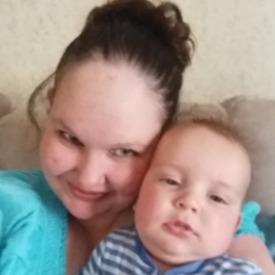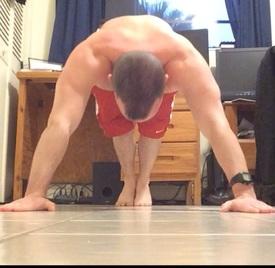Is there such a thing as "too sore" to workout?

farmgirlrrt
Posts: 168 Member
I am recovery from an ACL/Meniscus repair and 2 weeks ago (at 10 weeks post op) I was given my surgeon's blessing to run again. Last week a friend and I walked 6.1 miles and since yesterday was too cold to walk we used the gym. I finally worked up the courage to run and when I did I only stopped when I felt pain. So I ran a straight mile and then did a run/walk combo. Out of 6.5 miles I ran 3.3 miles of it. Needless to say I was sore and as the day continues on it's becoming even more sore/tender.
My question is how do you handle muscle soreness and fatigue after an intense workout? I've been told to eat plenty of protein because muscle fibers break down if you're feeling "the burn" or "feel sore" during or after a workout. My other question is this: Is there such a thing as being too sore to workout?
Thoughts?
My question is how do you handle muscle soreness and fatigue after an intense workout? I've been told to eat plenty of protein because muscle fibers break down if you're feeling "the burn" or "feel sore" during or after a workout. My other question is this: Is there such a thing as being too sore to workout?
Thoughts?
0
Replies
-
Is your post-op knee the sore part, or just general muscle soreness?0
-
If it's muscle soreness, "too sore" is when it affects my gait or lifting form. If it's related more to your surgery...I'd just take it easy.0
-
Shouldn't you ease back into it rather than starting with 6 miles?0
-
You are talking about two different things. Delayed Onset Muscle Soreness (DOMS) is totally natural, and is improved by working through it. You sound like you have pain from damaged tissue, do NOT push through that, you can permanently injure yourself so that needs to be discussed with your dr.0
-
Listen to your body. I tried to do my Plyo workout today, I couldn't even get through the first reps my calves were in serious pain. I stopped and went on a long walk instead to help stretch. Try to focus on not injuring yourself--that'll only hinder you more. Listen to your body. You'll know when enough is enough!0
-
There is definitely such a thing as too sore. Whether or not it's your meniscus only means more or less risk. When you work out you are actually created tears in your muscles which your body repairs into stronger muscles. The soreness is because you have a bunch of little tears. At some point when you are really sore, working through it just risks injury to the muscles in question. There is sore then there is really sore. If you can't tell the difference I suggest giving yourself a couple days to recover.0
-
:flowerforyou: I had the same problem with my knee too! Based on experience, if it's the knee that hurts I take 3-7 days break. If it's sore muscles and not the joint hurting, I just work through the soreness (given that i'm following a workout program and it's meant to be that way) but if you're not in a program I'd say do a day of stretching exercises
 So basically, if it's the joints that hurts I take days off, if it's muscle, I keep on pushing
So basically, if it's the joints that hurts I take days off, if it's muscle, I keep on pushing  0
0 -
In my experience recovering from an ACL/meniscus surgery, I found it helpful to ease into running slowly. My physiotherapist and doctor both had me walking a few miles, then alternating jogging/walking in 100m increments, then slowly reducing the walking distance and increasing the overall pace of my jogging. Of course, every doctor/physiotherapist's recommendation will vary depending on a patient's needs, but maybe try taking it "one step at a time" as opposed to diving right in?0
-
ThisYou are talking about two different things. Delayed Onset Muscle Soreness (DOMS) is totally natural, and is improved by working through it. You sound like you have pain from damaged tissue, do NOT push through that, you can permanently injure yourself so that needs to be discussed with your dr.
DOMS goes away by working out more frequently and getting in shape. Joint pain does not.0 -
Generally, yes you can be too sore to work out. You need to learn the difference between pain/injury and pain/soreness. You should rarely try and push through pain/injury or you'll risk doing more damage. In terms of pain/soreness, the best thing to do is to start doing your usual warm up. If after warming up you start to feel okay than you shouldbe fine to workout. If after warming up you're still a bit sore, then you may want to workout anyway but at a reduced intensity/time etc. If after you warmup you're still in significant pain or have a restricted range of motion then you probably want to skip the workout in favour of rest or some active recovery
Unfortunately this isn't really something we can really help with here, only you will know whether you're too sore to workout. As you get more experience under your belt this is something you will start to intuitively know from trail and error. To begin with there'll Be some days when you try to push through and it really won't be worth it and others where you end up feeling fine.
Also, given you're recovering from an injury I would ease off a bit and build up slowly. Injuries can bring out other weaknesses or imalances if you're not careful. Doing too much too quickly can also cause new injuries0 -
Thanks all for the advice. My knee doesn't actually hurt. It's all the large muscles. My PT asked how things were going and I was proud to tell her of my 3.3 miles that I ran. She said, "I said you could run and to ease into it... NOT DIVE into it". When I told her where I was sore and that it was equal on both sides she was a little relieved but scolded me. It's hard when you had to go without running for so long and it's right there but I also know that it's not worth the risk of reinjuring it either. I certainly did not go at the speed that I'm used to running.
Today, I am especially sore and I wanted to know what you all do to work through that so you can still remain active. There has been a lot of great advice given and I will certainly use it.0 -
Most PTs/docs assume that people have no idea how to interpret what their bodies are telling them and will steer you toward an ultra-conservative workout plan. Running 3 miles is not realistically a whole lot of distance in the scheme of things; I know people who run 30-40 miles a week. 3 miles is only a lot to people who have never done a serious running program.
My suggestion is to seek a running enthusiest site and see if anyone has had to recover from the same surgery. You'd get better advice from them than a PT who thinks a 3 mile run is extensive.
Muscle soreness is a part of getting in shape, and goes away after about 2 weeks if you workout everyday.0 -
Most PTs/docs assume that people have no idea how to interpret what their bodies are telling them and will steer you toward an ultra-conservative workout plan. Running 3 miles is not realistically a whole lot of distance in the scheme of things; I know people who run 30-40 miles a week. 3 miles is only a lot to people who have never done a serious running program.
My suggestion is to seek a running enthusiest site and see if anyone has had to recover from the same surgery. You'd get better advice from them than a PT who thinks a 3 mile run is extensive.
Muscle soreness is a part of getting in shape, and goes away after about 2 weeks if you workout everyday.
I got my surgeon's blessing to run...it was my PT that thought I should have been more conservative. Initially I compared (what I thought was slow) progress to others that I've seen online through youtube or other forums and my surgeon immediately told me NOT to compare myself to them. He said that every patient is different and recovery times vary.
I can compare my progress to a friend of mine who had the same surgery 5 weeks after me because he lives right up the road from me. He's discouraged because he worked out everyday right up until surgery and I stopped right after my injury...no exercise for 6 months. The difference in our recovery was that we had two different surgeons, two different grafts and his doctor refused to manage his pain properly. We don't know all the factors online so it's not a fair comparison.0 -
That is true. I think he was getting at not to feel bad if you can't handle what other people did or feel like superwoman if you can handle more. He didn't want you to over-do it because you feel like you are behind the curve.I got my surgeon's blessing to run...it was my PT that thought I should have been more conservative. Initially I compared (what I thought was slow) progress to others that I've seen online through youtube or other forums and my surgeon immediately told me NOT to compare myself to them. He said that every patient is different and recovery times vary.
But I'm not talking about comparing your progress, I'm talking about getting a safe, effective workout routine from people who won't go "OMGWTFYOURAN3MILESDON'TDOTHAT!!!1one" The 'experts' on the subject are going to be runners who have had your surgery and worked through rehab/recovery. They can lay out a general plan of what has been proven to work for people in your situation, and you can scale it to how your body handles it, rather than just yelling at you for running. I just don't put a lot of stock in someone who balks at jogging 3 miles.0 -
One time I challenged my little sister to 100 calf raises. I couldn't get out of bed for a week. This is not a joke.
Moral of the story, there is such thing as "too sore" to workout.0 -
That is true. I think he was getting at not to feel bad if you can't handle what other people did or feel like superwoman if you can handle more. He didn't want you to over-do it because you feel like you are behind the curve.I got my surgeon's blessing to run...it was my PT that thought I should have been more conservative. Initially I compared (what I thought was slow) progress to others that I've seen online through youtube or other forums and my surgeon immediately told me NOT to compare myself to them. He said that every patient is different and recovery times vary.
But I'm not talking about comparing your progress, I'm talking about getting a safe, effective workout routine from people who won't go "OMGWTFYOURAN3MILESDON'TDOTHAT!!!1one" The 'experts' on the subject are going to be runners who have had your surgery and worked through rehab/recovery. They can lay out a general plan of what has been proven to work for people in your situation, and you can scale it to how your body handles it, rather than just yelling at you for running. I just don't put a lot of stock in someone who balks at jogging 3 miles.
that's a good idea. and then just modify if it's not working. I have to modify my squats and lunges because the one knee doesn't quite bend the same as the other one so it would work the same for running.0 -
Most PTs/docs assume that people have no idea how to interpret what their bodies are telling them and will steer you toward an ultra-conservative workout plan. Running 3 miles is not realistically a whole lot of distance in the scheme of things; I know people who run 30-40 miles a week. 3 miles is only a lot to people who have never done a serious running program.
My suggestion is to seek a running enthusiest site and see if anyone has had to recover from the same surgery. You'd get better advice from them than a PT who thinks a 3 mile run is extensive.
Muscle soreness is a part of getting in shape, and goes away after about 2 weeks if you workout everyday.
In the scheme of things I don't see what the running habits of healthy, high volume runners has to do with someone that's just returning to exercise after being laid up with injury and then having surgery. People run 30-40 miles per week, but the OP had run zero miles two weeks ago and then ran 3 miles and walked 3 miles. I'm gonna go ahead and side with the PT and suggest that she ease back into physical activity0 -
Id say listen to your body but it sounds like that may have gotten you injured in the first place. Not sure how you tore your ACL. If you did it by being overzealous than I'd say use common sense and don't push yourself as hard as you'd like to.
No sense in running into another injury.
My mom is a physical therapist. She has a great understanding of injuries and musculature, but, her knowledge on how to train is very slim. I wouldn't hang on every word your physical therapist says but I also wouldn't flat out ignore it.
Its probably just DOMS, but, your conditioning took a 10 week break and 6.1 miles seems a bit much. I also thinking walking another 3 miles, because it hurt enough that your body said "no", was a bad idea. It kinda shows unwillingness to listen to your body;s signals. Surely you didnt have DOMS in the middle of a run, so, why keep going?
thats my opinion.... ive had enough injuries that I dont mess with them anymore. it never ended well when i pushed it.... you also gotta consider that that 10 week time frame was an arbitrary number. Different people heal at different rates. Its not a simple formula.0 -
Read a little more closely. I said that she would have a better chance of finding a runner who dealt with an ACL injury on a runner's board, and they can give her advice on how to get back into shape.In the scheme of things I don't see what the running habits of healthy, high volume runners ...
Because a PT who goes "OMG3MILES!!1one" isn't the right source.0 -
So you believe the PT made his/her remarks without context?0
-
Well typicall muscle soreness from exercise (DOMS) won't hurt you, but yeah I had DOMS bad enough to where it hindered me from working those muscles. But it's avoidable, just start light and easy and work your way up.
If it's straight painful, sharp pains and stuff (you know the difference), then take it easy.0 -
When did I say that. I think OP made the context quite clear, and I think that, given the context, the PT is an idiot.So you believe the PT made his/her remarks without context?0 -
Thanks all for the advice. My knee doesn't actually hurt. It's all the large muscles. My PT asked how things were going and I was proud to tell her of my 3.3 miles that I ran. She said, "I said you could run and to ease into it... NOT DIVE into it". When I told her where I was sore and that it was equal on both sides she was a little relieved but scolded me. It's hard when you had to go without running for so long and it's right there but I also know that it's not worth the risk of reinjuring it either. I certainly did not go at the speed that I'm used to running.
Today, I am especially sore and I wanted to know what you all do to work through that so you can still remain active. There has been a lot of great advice given and I will certainly use it.
Since your PT has already (and properly) scolded you, I won't pile on ;-)
The soreness you are experiencing is what you would expect doing that much work after such a serious injury. It will likely take a good 6-7 days to resolve. Some recommendations for treatment include ibuprofen, ice, and even compression stockings. I'm not sure how much real relief those provide. In any case, you should be OK to do whatever activity (within the guidelines your PT gave you) you can tolerate. The main thing to be aware of is if the soreness is causing you to change your movements, or prevents you from moving through a full range of motion. If that's the case, then a day or two of rest and stretching might be in order. Otherwise, some lower-impact cardio is probably a good choice. You likely won't make the soreness any worse at this point.0
This discussion has been closed.
Categories
- All Categories
- 1.4M Health, Wellness and Goals
- 398.5K Introduce Yourself
- 44.7K Getting Started
- 261K Health and Weight Loss
- 176.4K Food and Nutrition
- 47.7K Recipes
- 233K Fitness and Exercise
- 462 Sleep, Mindfulness and Overall Wellness
- 6.5K Goal: Maintaining Weight
- 8.7K Goal: Gaining Weight and Body Building
- 153.5K Motivation and Support
- 8.4K Challenges
- 1.4K Debate Club
- 96.5K Chit-Chat
- 2.6K Fun and Games
- 4.8K MyFitnessPal Information
- 17 News and Announcements
- 21 MyFitnessPal Academy
- 1.5K Feature Suggestions and Ideas
- 3.2K MyFitnessPal Tech Support Questions











